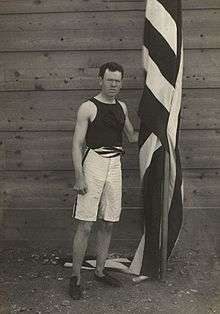1896 Summer Olympics medal table
The 1896 Summer Olympics medal count is a list of National Olympic Committees ranked by the number of medals won during the 1896 Summer Olympics—the first Olympic Games of the Modern era—held in Athens, Greece, from 6 to 15 April 1896. A total of 241 athletes from 14 nations participated in 43 events in nine sports at these games.[1]

Ten of the fourteen participating nations earned medals, in addition to three medals won by mixed teams, i.e. teams made up of athletes from multiple nations. The United States won the most gold medals (11) with 14 athletes participating, while host nation, Greece with 169 athletes participating, won the most medals overall (46) as well as the most silver (17) and bronze (19) medals, finishing with one less gold medal than the United States, having 155 athletes more than the US.[2]
In the early Olympic Games, several team events were contested by athletes from multiple nations.[3] Retroactively, the IOC created the designation "Mixed team" (with the country code ZZX) to refer to these group of athletes. Some athletes won medals both individually and as part of a mixed team, so these medals are tabulated under different nations in the official counts. Dionysios Kasdaglis, an athlete of Greek origins living in Alexandria, Egypt, is listed by the IOC as Greek during his competition in the singles tennis competition but Kasdaglis and his doubles tennis teammate, Greek athlete Demetrios Petrokokkinos, are listed a mixed team.[2]
During these inaugural Olympics, winners were given a silver medal and an olive branch, while runners-up received a copper medal and a laurel branch.[4] The IOC has retroactively assigned gold, silver and bronze medals to the three best placed athletes in each event to comport with more recent traditions.[2] Three ties resulted in medals being shared between athletes, increasing the medal count of various nations. These include ties between Francis Lane of the United States and Alajos Szokolyi of Hungary, for the third place in the 100 metres; between Evangelos Damaskos and Ioannis Theodoropoulos of Greece in the pole vault; and between Konstantinos Paspatis of Greece and Momcsilló Tapavicza of Hungary, in singles tennis. In addition, bronze medals were not awarded in a number of events where there was no third-place finisher.[4][5]
Medal count

This is the full table of the medal count of the 1896 Summer Olympics, based on the medal count of the International Olympic Committee (IOC).[a] These rankings sort by the number of gold medals earned by a country. The number of silver medals is taken into consideration next and then the number of bronze medals. If, after the above, countries are still tied, equal ranking is given and they are listed alphabetically. This information is provided by the IOC, however the IOC does not recognise or endorse any ranking system.[2]
Host nation (Greece)
| Rank | Nation | Gold | Silver | Bronze | Total |
|---|---|---|---|---|---|
| 1 | 11 | 7 | 2 | 20 | |
| 2 | 10 | 17 | 19 | 46 | |
| 3 | 6 | 5 | 2 | 13 | |
| 4 | 5 | 4 | 2 | 11 | |
| 5 | 2 | 3 | 2 | 7 | |
| 6 | 2 | 1 | 3 | 6 | |
| 7 | 2 | 1 | 2 | 5 | |
| 8 | 2 | 0 | 0 | 2 | |
| 9 | 1 | 2 | 3 | 6 | |
| 10 | 1 | 2 | 0 | 3 | |
| 11 | 1 | 1 | 1 | 3 | |
| Totals (11 nations) | 43 | 43 | 36 | 122 | |
Notes
a There are sources, besides the International Olympic Committee (IOC), that display variations in the medal totals, but as the governing body of the Olympic Games, the IOC is considered the most authoritative source for the purposes of this article.
References
- "Athens 1896–Games of the I Olympiad". International Olympic Committee. Archived from the original on 6 May 2008. Retrieved 5 May 2008.
- "Athens 1896–Medal Table". International Olympic Committee. Archived from the original on 8 May 2008. Retrieved 5 May 2008.
- "1896 – Summer Olympics I (Athens, Greece)". TSN. Archived from the original on 18 June 2008. Retrieved 6 May 2008.
- De Coubertin, Pierre; Timoleon J. Philemon, N.G. Politis and Charalambos Anninos (1897). The Olympic Games: BC 776–AD 1896 (PDF). The Olympic Games in 1896 – Second Part. Athens: Charles Beck. pp. 232–4. Archived (PDF) from the original on 27 May 2008. Retrieved 6 May 2008.
- "Olympic Medal Winners". International Olympic Committee. Archived from the original on 9 May 2008. Retrieved 5 May 2008.